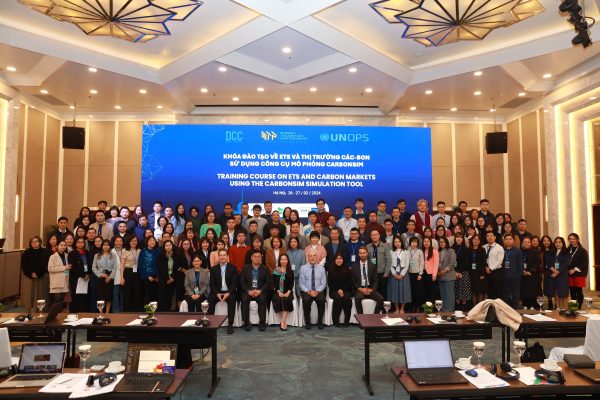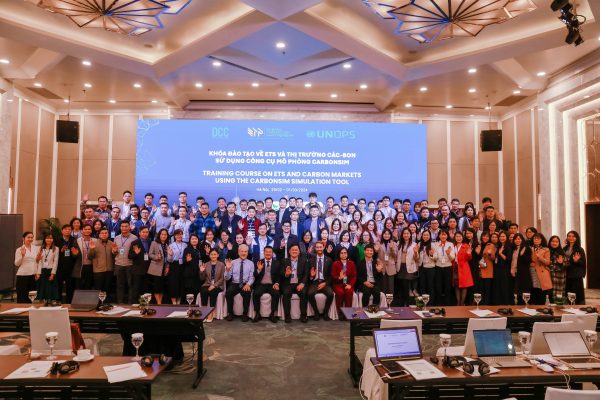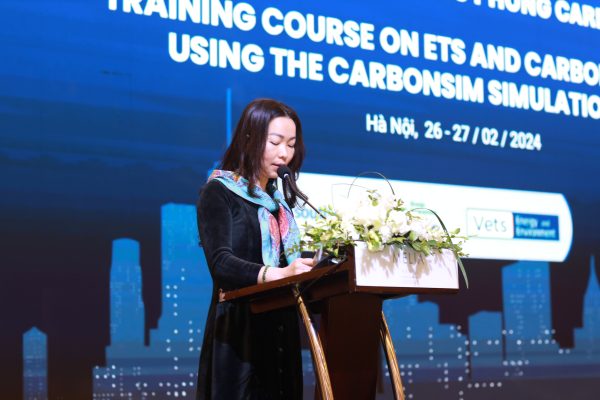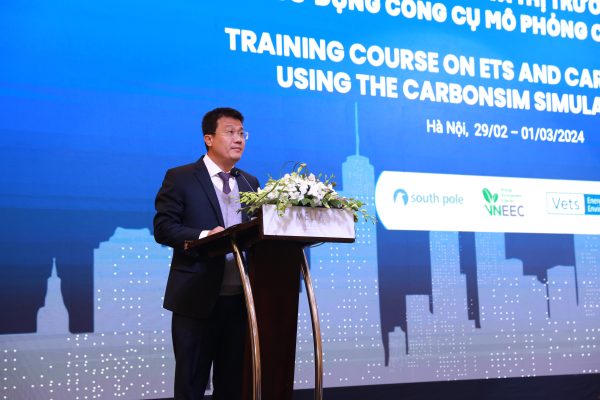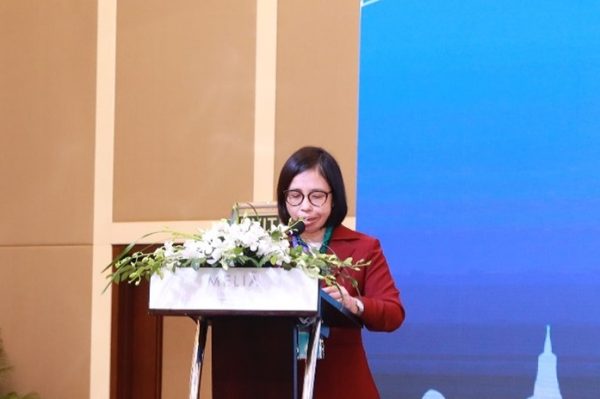VNEEC successfully organized 02 training courses on ETS and carbon market in Hanoi
04/03/2024
At the end of February 2024, 02 training courses on Emission Trading Systems (ETS) and the carbon market, organized by the Southeast Asia Energy Transition Partnership (ETP) in cooperation with the Department of Climate Change (DCC), Ministry of Natural Resources and Environment (MONRE), took place successfully at Melia Hanoi Hotel.
(Photo: Participants in the first training course)
The first training course occurred on February 26 and 27, 2024 with representatives from relevant ministries and agencies involved in establishing and managing the carbon trade exchange and carbon market in Vietnam, along with development organizations, financial institutions, and other stakeholders.
(Photo: Participants in the second training course)
The second training course is designed specifically for representatives from big emitters, associations, and media, took place on February 29 and March 1, 2024.
The 2-day training courses on ETS and the carbon market are part of ETP’s support aiming to develop the carbon market in Viet Nam in cooperation with DCC, MONRE under the Technical Assistance (TA) “Emission Trading System (ETS) Piloting and Simulation in Vietnam”.
The main objective of the TA is to develop and organize training courses on ETS and the carbon market, using the ETS simulation tool tailored to the Vietnam context for various stakeholders including policymakers, research institutes, universities, financial institutions, media representatives, and especially big emitters that will be covered under Vietnam’s ETS in the future.
This is the first capacity-building training in Vietnam that has attracted the participation of stakeholders from both public and private sectors with a comprehensive and systematic training program on ETS and carbon markets, incorporating the use of the CarbonSim market simulation tool customized to the Vietnamese context. Additionally, the vncarbonmarket.com website, within the framework of the Technical Assistance (TA), has been developed to provide knowledge, enhance awareness, and readiness of stakeholders for future ETS implementation in Vietnam.
After opening the registration for participation, both training courses have attracted significant interest from the environmental community, policymakers, as well as businesses, with a large number of registrations exceeding expectations. Each course has received approximately 150 registrations. To ensure quality, the organizers have limited the number of participants, allowing only one representative per company to attend the training course. Therefore, despite the high interest from many businesses, the organizers regretfully have to decline some requests to ensure the smooth of the training courses.
(Photo: Ms. Mai Kim Lien, Deputy Director of the Department of Climate Change)
Speaking at the training course for policymakers, Dr. Mai Kim Lien, Deputy Director of DCC, stated: “Vietnam has determined to apply carbon pricing tools, specifically the compliance carbon market, to support the goal of greenhouse gas (GHG) emissions reduction.” Ms. Lien added that within the framework of the Memorandum of Understanding (MOU) between DCC and UNOPS, ETP, one of the support activities involves selecting and guiding the use of a simulation tool for the ETS to provide stakeholders with a better understanding of functions, operational processes, management, and trading of emission allowances and carbon credits on the exchange.
(Photo: Mr. Nguyen Tuan Quang, Deputy Director of the Department of Climate Change)
At the second training course, Dr. Nguyen Tuan Quang, Deputy Director of DCC, revealed that Vietnamese businesses have been trading carbon credits on the global voluntary carbon market since the mid-2000s, through mechanisms such as Clean Development Mechanism (CDM) since 2006; Gold Standard (GS) mechanisms… To establish and operate a domestic carbon market, the government has issued a roadmap for implementing a domestic compliance carbon market, with a crucial goal of piloting carbon trade exchange from 2025, officially operating in 2028. Therefore, guidance on implementing domestic and international carbon trade exchange and offset mechanisms in accordance with legal regulations and international conventions, along with capacity-building activities and raising awareness of the carbon market, is crucial and necessary.
This training course on ETS and carbon markets using the CarbonSim simulation tool is an opportunity for experts to present and introduce the establishment and operation of ETS, carbon markets, as well as hands-on training in using market simulation tools in practice.
Lectures are developed and presented by leading international and domestic experts in the fields of climate change mitigation and carbon pricing. This training initiative comes at a critical period when Vietnam is committed to reducing GHG emissions in accordance with its obligations under the Paris Agreement.
(Photo: Ms. Dang Hong Hanh, Team Leader, Climate Change Policy Expert, Co-Founder, Managing Director of Energy and Environment Consulting Joint Stock Company (VNEEC))
Ms. Dang Hong Hanh, Team Leader, Climate Change Policy Expert, Co-Founder, and Executive Director of Energy and Environment Consultancy Joint Stock Company (VNEEC) stated that VNEEC has conducted surveys on 537 businesses in the sectors of industry, construction, waste management, and transportation across the country, with emissions estimated at over 10,000 tons of CO2 equivalent.
These businesses are expected to participate in the pilot phase of ETS implementation in Vietnam among the 1,912 businesses that are obliged to report on GHG inventories according to the Prime Minister’s decision. From the survey results, the number of businesses that have conducted GHG inventories is still quite limited, accounting for nearly 32%, with the majority opting for self-conducted inventories, accounting for nearly 70%, and the remainder hiring third-party entities. Up to 57.38% of the businesses surveyed have not yet formulated plans to reduce GHG emissions, while only around 28% have established such plans.
It is worth mentioning that businesses’ understanding of ETS and the carbon market is still limited. Over 50% have heard about ETS and the carbon market but lack knowledge of the fundamental principles, a few are unaware of where ETS and the carbon market operate, and only a very small percentage, 1.27 %, how ETS and the carbon market function. “This indicates a significant demand for ETS and carbon market training.”, Ms. Hanh emphasized.
But the good news is that, according to Ms. Hanh, the level of readiness of businesses to learn about this issue is quite high. Most businesses express a desire to participate in training courses on ETS and gain knowledge about carbon emission reduction goals…

